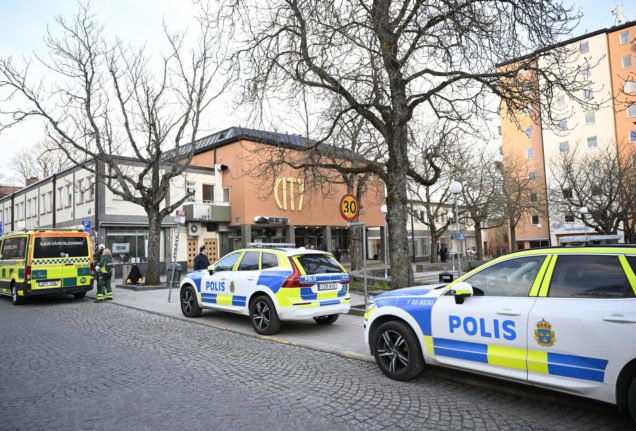What happened?
Several masked men burst into a Stockholm theatre on Wednesday night and set off smoke bombs during an anti-fascism event, according to police and participants.
Around 50 people were taking part in the event at the Moment theatre in Gubbängen, a southern suburb of the Swedish capital, organised by the Left Party and the Green Party.
“Three people were taken by ambulance to hospital,” the police said on its website, shortly after the attack.
According to Swedish media, one person was physically assaulted and two had paint sprayed in their faces.
“The Nazis attacked visitors using physical violence, with pepper spray, and vandalised the venue before throwing in some kind of smoke grenade which filled the foyer with smoke,” Expo wrote on its website.
The magazine’s head of education Klara Ljungberg was at the event in order to hold a lecture at the invitation of the two political parties.
What was the meeting about?
According to the Left Party’s press officer, the event was “a meeting about growing fascism”.
Left Party leader Nooshi Dadgostar described the event to public broadcaster SVT as an “open event, for equality among individuals”.
As well as Ljungberg from Expo, panelists at the event included anti-fascist activist Mathias Wåg, who also writes for Swedish centre-left tabloid Aftonbladet.
“They were determined and went straight for me,” Wåg told Expo just after the attack. “I received a few blows but nothing that caused serious damage.”
“I was invited to be on a panel in order to discuss anti-fascism with representatives from the Left Party and the Green Party,” he told the magazine. “I didn’t know this was going to happen, but there’s obviously a risk when Expo and I are in the same place.”
What has the reaction been like?
All of Sweden’s parties across the political spectrum have denounced the attack, with Dadgostar describing it as a “threat to our democracy” when TT newswire interviewed her at the theatre a few hours after the attack occurred.
Prime Minister Ulf Kristersson, from the conservative Moderates, called the attack “abhorrent”.
The Moderates, Christian Democrats and Liberals are currently in government with the support of the far-right Sweden Democrats, while the Social Democrats, Left Party, Centre Party and Green Party are in opposition.
“It is appalling news that a meeting hosted by the Left Party has been stormed,” Kristersson told TT. “I have reached out to Nooshi Dadgostar and expressed my deepest support. This type of abhorrent action has no place in our free and open society.”
“Right-wing extremists want to scare us into silence,” Social Democrat leader Magdalena Andersson wrote on X. “They will never be allowed to succeed.”
“The attack by right-wing extremists at a political meeting is a direct attack on our democracy and freedom of speech,” Green Party co-leader Daniel Helldén wrote on X. “My thoughts are with those who were affected this evening.”
Sweden Democrat party leader Jimmie Åkesson wrote in an email to TT that “political violence is terrible, in all its forms, and does not belong in Sweden.”
“All democratic forces must stand in complete solidarity against all kinds of politically motivated violence,” he continued.
His party has previously admitted to being founded by people from “fascist movement” New Swedish Movement, skinheads, and people with “various types of neo-Nazi contact”.
“It is an attack not only on the Left Party, Green Party and the Expo Foundation, but also on our entire democratic society,” Centre Party leader Muharrem Demirok, who referred to the attackers as “Nazis”, wrote on social media. “Those affected have all my support.”
Christian Democrat leader Ebba Busch and Liberal leader Johan Pehrson both referred to the attackers as “anti-democratic forces”.
“It is never acceptable for a political meeting to be stormed by anti-democratic forces,” Busch wrote. “There is no place for this in our society.”
“Anti-democratic forces like this represent a serious threat to our democracy and must be met with society’s hardest iron fist,” Pehrson said.
What about the attackers? Has anyone been arrested?
Not yet. The police had not made any arrests at the time of writing on Thursday morning.
According to TT, police did not want to comment on who could be behind the attack.
It is currently being investigated as a violation of the Flammable and Explosive Goods Act, assault, causing danger to others and disturbing public order.



 Please whitelist us to continue reading.
Please whitelist us to continue reading.
The only thing fascists know is to attack and exert violence. Nothing else.